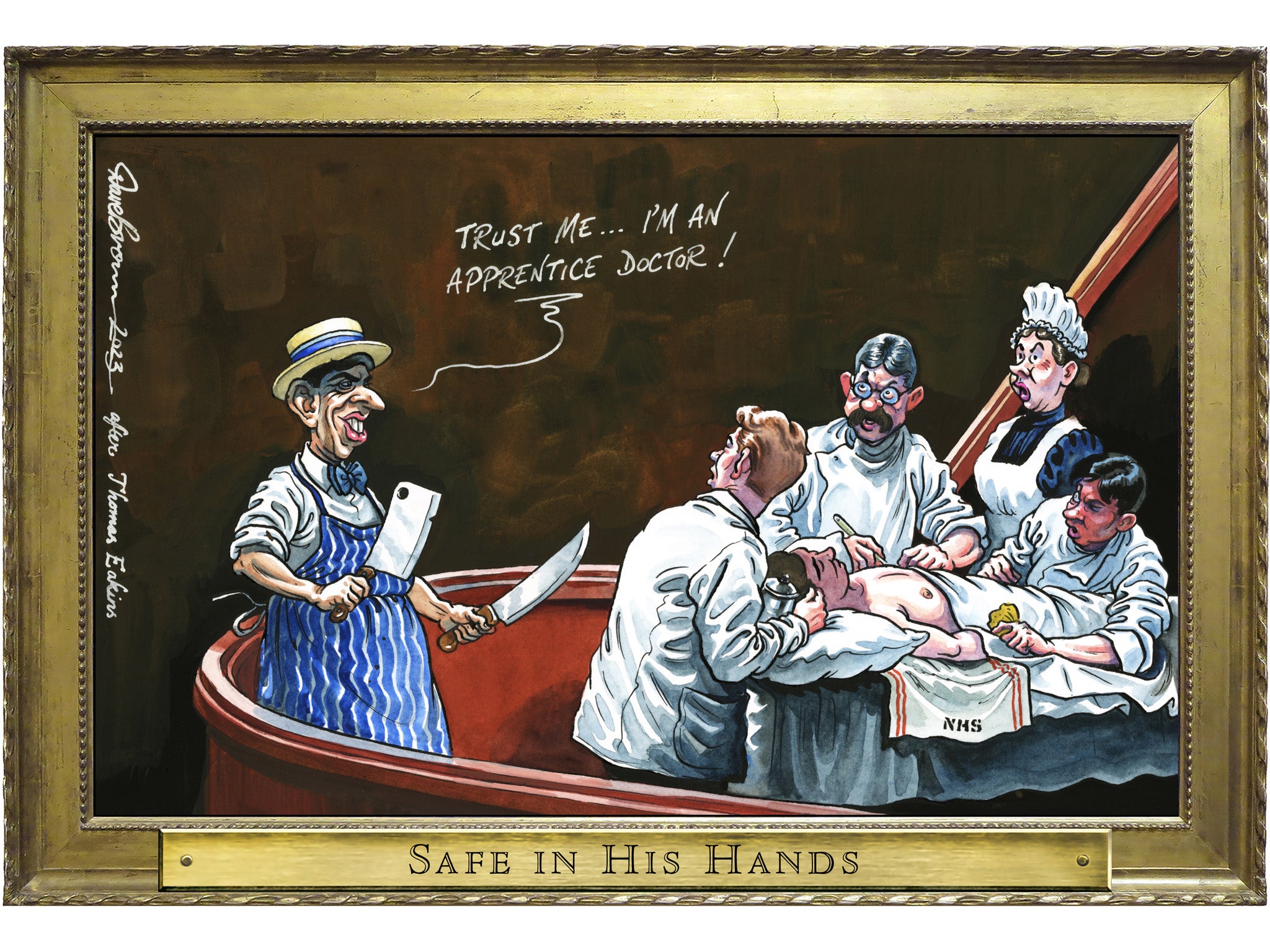After the trauma of Covid and strikes, the NHS finally has reason to think positively about its future
Editorial: It’s heartening to see a Conservative government – led by an enthusiastic free marketeer – treat the NHS like it actually has a long-term future

On 5 July, Britain’s National Health Service celebrates its 75th birthday. Remarkably, in all that time, it has never, until now, had a long-term workforce plan, which is quite the delay even by current health service standards. With a 15-year timescale, it should see the NHS well on its way to its centenary celebrations in 2048. That is something to cheer the spirit, even in these straitened times.
Wisely, Rishi Sunak chose to downplay the politics and launch this extremely welcome (if historically delayed) initiative flanked by two senior NHS executives: Stephen Powis (the national clinical director of pandemic fame) and Amanda Pritchard, chief executive of NHS England.
Their presence was reassuring, because it confirmed that this wasn’t some sloganeering piece of spin patched together by spads in Downing Street or the Treasury, but rather a document that has been created by trusted NHS staff themselves. That’s good to know.
As Ms Pritchard said, it is “ambitious and bold”, and it should, if properly funded and implemented, work. It certainly deserves to succeed. The prescription is a long one, as it has to be, and commendably detailed. The targets for training are clear and apparently fit within a planned increase in NHS capacity.
They should, in time, reduce waiting lists, cut the exorbitant cost of agency staff, reduce recruitment from abroad (too often from poorer nations where clinical staff are more urgently needed), and support the creation of new classes of medic in an effort to make patient care more flexible and efficient – nurse associates and physician associates.
There is even talk of a recovery in NHS dentistry, a service that has been scandalously and surreptitiously run down for some decades. Trainee NHS staff will be obliged to have a stronger commitment to NHS work.
No longer will it be quite so routine for the taxpayer to spend hundreds of thousands of pounds training doctors and dentists, only to see them drift off to Australia and other lucrative destinations.
Of course, pay and pensions are also important factors in retaining staff, but members of the British Medical Association, the Royal College of Nurses and the other unions should be encouraged that having more staff will improve conditions, ease overtime demands, and take some of the stress out of following their vocation.
Professor Powis also spoke optimistically about how new technologies – such as artificial intelligence – can further ease the burdens on staff; and how “virtual wards” can enable people to be treated and recover at home under remote supervision.
Just for a change, the NHS was being discussed not in the dismal language of industrial disputes and intractable waiting lists, but with hope and excitement in the air. Strange to say, after the traumas of the Covid pandemic and its aftermath, and the current wave of strikes (which are slowly being settled), the NHS has reason to think positively about its future.
It has proved its worth – not least in the pioneering vaccine rollout – and it is on the way to recovery and normality. There will be reforms, there will be change (though hopefully no more futile, wasteful “top-down” reorganisations), and there will still be winter crises; but there is also the prospect of climbing out of perma-crisis.
The only gripe is that it has all taken so long to arrive – after 13 years of Conservative-led governments, and despite the powerful advocacy of Jeremy Hunt as chair of the health select committee, and again as a leadership candidate, as prime minister Boris Johnson stubbornly ignored his demands.
It’s fair to add that Mr Hunt might have done more about it during his long stint as health secretary, but now he is chancellor he can stake some pride in its funding and implementation.
At a cost of £2.7bn over five years, a small sum in the context of total public spending, it is in fact curious that such an affordable and powerful improvement in NHS effectiveness was neglected for quite so long.
Given that a long-term staff plan is also what the Labour opposition spokesperson Wes Streeting has been urging for some time, it even has some chance of commanding cross-party consensus and surviving changes of government over its lifetime.
So long as there are waiting lists – and emotive words such as “privatisation” are cynically kicked around in debate – the NHS will remain a political football in a match that the Tories always lose.
For that reason, it’s heartening to see a Conservative government – led by an enthusiastic free marketeer – treat the NHS like it actually has got a long-term future. After Covid and a period of relapse, the NHS should soon be starting to make progress.






Join our commenting forum
Join thought-provoking conversations, follow other Independent readers and see their replies
Comments